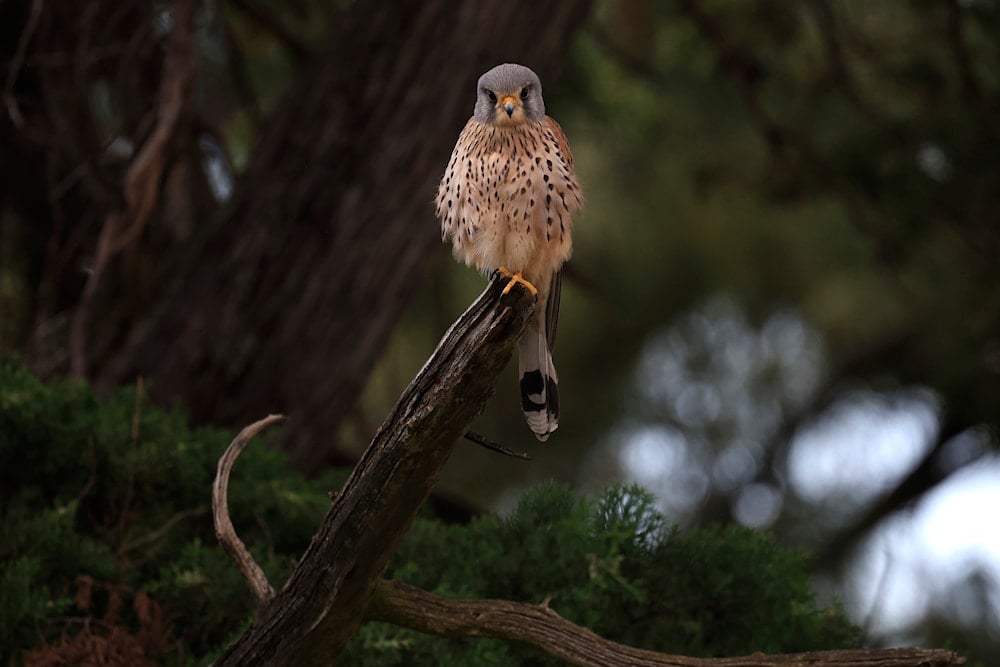Human activity driving biodiversity loss across all species: Study
A global study finds human activity is accelerating biodiversity loss, with habitat destruction, pollution, and climate change among the main drivers of decline.
-
 A male common kestrel (Falco tinnunculus), stands on a tree in Nice, southern France, on March 26, 2025 (AFP)
A male common kestrel (Falco tinnunculus), stands on a tree in Nice, southern France, on March 26, 2025 (AFP)
A comprehensive synthesis of over 2,000 studies has revealed that human activity is driving biodiversity loss across all species globally, The Guardian reported.
According to researchers from the Swiss Federal Institute of Aquatic Science and Technology (Eawag) and the University of Zurich, this extensive analysis, which covered nearly 100,000 sites worldwide, confirms the profound and damaging impact humans are having on Earth's ecosystems.
The study, published in Nature, highlights the "unprecedented effects" of human actions on biodiversity.
Largest synthesis of human impact on biodiversity
Florian Altermatt, Professor of Aquatic Ecology at the University of Zurich and head of Eawag, described the study as "one of the largest syntheses of the human impacts on biodiversity ever conducted worldwide."
The researchers examined terrestrial, freshwater, and marine ecosystems, considering a broad range of organisms, from microbes to mammals. They found that human pressures significantly altered the composition of species communities and reduced local diversity. On average, the number of species at human-impacted sites was nearly 20% lower than at sites unaffected by human activity.
Reptiles, amphibians, and mammals experienced particularly severe losses, as their populations are generally smaller than those of invertebrates, making them more vulnerable to extinction, according to the paper.
Five key drivers of biodiversity decline
The study focused on five major drivers of decline: Habitat change, direct resource exploitation (such as hunting and fishing), climate change, invasive species, and pollution. Francois Keck, the lead author and a postdoctoral researcher in Altermatt’s team, stated, “Our findings show that all five factors have a strong impact on biodiversity worldwide, in all groups of organisms and in all ecosystems.”
Pollution and habitat changes, often driven by agricultural practices, had a particularly detrimental effect on biodiversity. Intensive agriculture, especially arable farming, involves the use of large quantities of pesticides and fertilizers, which not only reduce biodiversity but also alter species composition. The full impact of climate change on species is still not completely understood.
While the overall effect of human activity on biodiversity is negative, the researchers noted some regional variations in how human impact and biodiversity homogenization manifested. Previous studies often focused on specific locations or human impacts, making it difficult to generalize about human activity's global effects on biodiversity.
Keck emphasized, “It’s not just the number of species that is declining. Human pressure is also changing the composition of species communities.”
For example, in mountainous regions, specialized plants are being replaced by species typically found at lower altitudes. This phenomenon, known as the “elevator to extinction,” threatens high-altitude plants with extinction since they have no higher elevations to migrate to. This means that while species numbers may remain stable, biodiversity is still reduced.
Read more: Climate whiplash: Extreme weather patterns disrupt major global cities
The challenge of reversing biodiversity loss
The researchers concluded, “Bending the curve of contemporary biodiversity loss and change is one of the greatest challenges facing our society,” and stated that their study provides an "important benchmark" for shaping future conservation strategies.
Lynn Dicks, Professor of Ecology at Cambridge University, called the study "useful and important" but noted that its findings were unsurprising. She observed, “We know that humans are hugely changing biodiversity across the planet, causing new and different communities of plants, animals, and microbes to form, which can cope with the sometimes very harsh conditions we create."
Dicks also expressed concern about ensuring that species able to coexist with humans, many of which provide vital ecological services such as pollination, decomposition, and seed dispersal, maintain large enough populations and sufficient genetic diversity to continue evolving.
Professor Alexandre Antonelli, Director of Science at Kew Gardens, praised the study for showing "unprecedented clarity the ubiquitous negative influence of human activities on nature."
He concluded, “This is an excellent piece of research that demonstrates the importance of biological inclusion – from plants and fungi to mammals and fish – in assessing the impact of humans on biodiversity at local, regional and global scales.”
Read more: Nearly every country on Earth failed to meet WHO air guidelines: Study

 4 Min Read
4 Min Read









